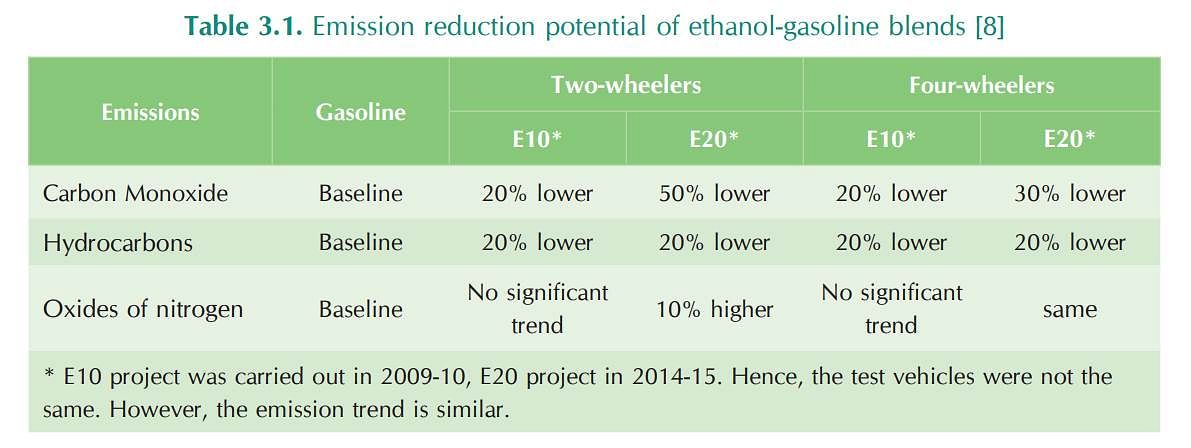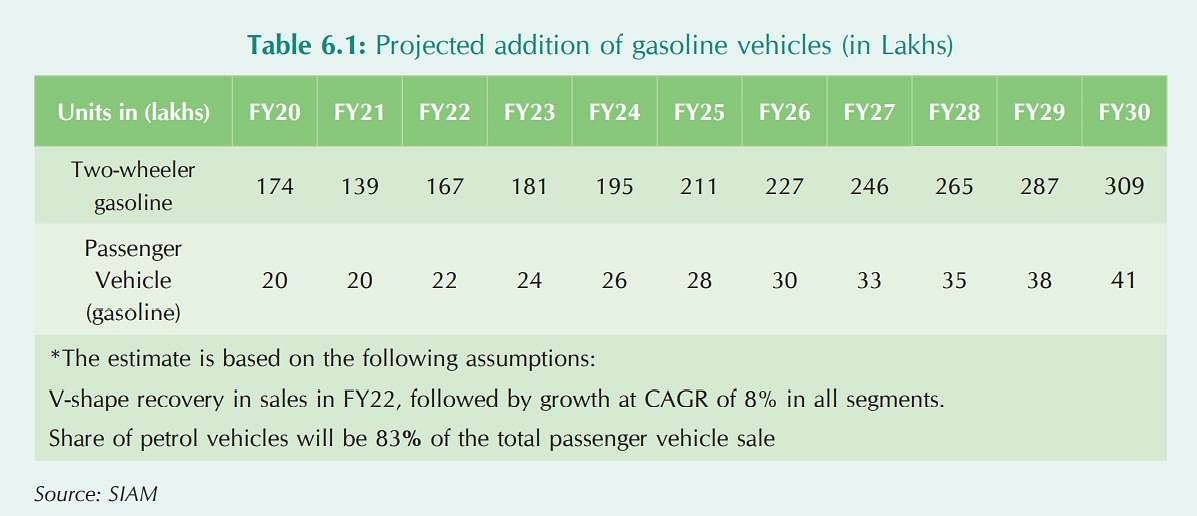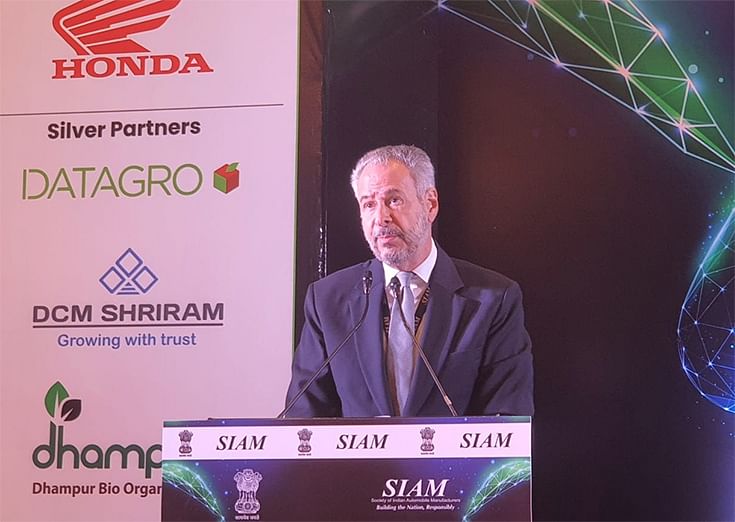Biofuels can be the pathway to carbon-neutrality: experts at SIAM conference
Conference on biofuels sees automotive industry experts, academia, and other stakeholders share best practices, debate and disseminate learnings on biofuels, especially ethanol.
Biofuels, which are produced from biomass such as plants, are among the promising alternative fuel sources for use in vehicles. Ethanol, the world’s most widely produced biofuel, is made from sugarcane or starchy plants, produces around 65% to 70% lower CO2 emissions than fossil fuels. India, which is sugarcane-surplus, has an eco-friendly and cost-saving opportunity waiting to be tapped to its full potential.
In 2021, India imported 185 million tonnes of petroleum at a cost of $551 billion (Rs 4,401,388 crore), which constituted about 85% of oil imports. A 20% blending of ethanol has the potential to save forex worth $4 billion (Rs 30,000 crore) a year. This will help not not only reduce greenhouse emissions but also improve farmers' income.
Apex industry body SIAM (Society of Indian Automobile Manufacturers) hosted a global conference on ‘Biofuels – A Pathway Towards A Sustainable Future’ in New Delhi yesterday. Part of SIAM’s programme to promote ethanol, the event saw participation from automotive industry experts, government officials, academia, and other stakeholder associations including the ambassador and experts from Brazil, which has successfully transitioned to using ethanol in vehicles.

Driving towards a biofuel economy
India is looking to accelerate the drive to E20 (20% ethanol blend in fuel) with a plan for vehicles to be material compliant by 2023 and fully E20-compliant vehicles by 2025. The day-ong Biofuels Conference saw delegate debate and discuss best practices, experiences and disseminate learnings on biofuels, especially ethanol. In addition, issues related to emissions, GHGs, and decarbonisation in the automotive sector were also discussed.


There were three sessions: a Minister Plenary Session on ‘A Giant Leap for Biofuels – Ethanol Blending & SATAT Scheme’, ‘Improving Urban Air Quality– Environmental Benefits of Biofuels’, and a Panel discussion session on ‘Trends in Biofuel Production – Maturing into a Biofuel Economy’.
Kicking off the proceedings of the day, Vinod Aggarwal, President, SIAM, CEO and MD, VE Commercial Vehicles, said, “The Indian automotive industry is working closely with the government as we transition to sustainable transportation through implementation of stringent emission standards and increased emphasis on alternate fuels. Biofuels like ethanol offer a pathway towards a sustainable future which includes clean air and less dependence on imported oil.”
The chief guest, Minister Hardeep Singh Puri, Ministry of Petroleum and Natural Gas, said, “It is essential to explore and promote alternative energy resources to reduce dependence on the import of fossil fuels. Environmental conservation is also critical to our developmental journey. Under the SATAT scheme, many entrepreneurs have established CBG plants to produce and supply CBG to oil marketing companies. With the assistance of OMCs and other enthusiastic players, 37 CBG plants have been commissioned, and approximately 9000 tonnes of compressed biogas (CBG) have already been sold. In order to make decarbonised mobility a reality, Indian automakers must stay on the path of sustainability.”

Andre Aranha Correa Do Lago: “Brazil is India's biggest ally for achieving a sustainable future of mobility and working towards promoting ethanol and flex-fuel technology.”
The guest of honour, Andre Aranha Correa Do Lago, Ambassador of Brazil to India, mentioned about the strong partnership that India has built with Brazil on the journey to ethanol adoption. He emphasised the parallels between the two countries and focused on the benefits that would accrue to India because of usage of higher blends of ethanol. He reiterated his support for SIAM’s initiatives in the direction of sustainable low-carbon mobility.
Atsushi Ogata, President, CEO & MD, Honda Motorcycle & Scooter India, said, “Due to the advance information dissemination of all competitors in the market, customers in India are extremely aware about the performance requirements and environmental footprints of the products available to them. Customers in India will need a very strong assurance from product performance side and incentives from policy side for ethanol adoption in the complete vehicle parc.”
Pankaj Jain, Secretary, Ministry of Petroleum and Natural Gas, said, “With the efforts made by government and energy industry stakeholders, the existing installed capacity of molasses-based distilleries has reached 426 crore litres and likely to reach 1,200 crore litres for the effective target of 20% blending in gasoline. Like the plant inaugurated in Panipat in August 2022, multiple new second- generation ethanol production plants will be installed across the nation.”
Vikram Kasbekar, Executive Director, Hero MotoCorp, said: “Alternate fuels like ethanol can help in addressing the challenges towards reducing carbon footprint, lowering fuel import bill, utilising agricultural surplus and strengthening energy security.”
Presenting his views, Dr. S S V Ramakumar, Director – R&D, IOCL, laid down the contributions and responsibilities of OMCs in adoption of low carbon fuels. He also emphasised the information dissemination required for realization of benefits for the farmers in biofuel economy. “The last word on 2G ethanol technology has not been spoken yet. India Oil has taken upon itself to produce the enzymes on-site which will reduce operational expenditure drastically,” he said.
CV Raman, Chair, SIAM Emissions & Conservation Committee & CTO, Maruti Suzuki India, said: “ India is the fourth largest GHG and methane emitter. It's likely to rise and impact the country's energy security. We need to adopt sustainable growth plans. Biofuel can help achieve carbon-neutrality.”

India has already achieved 10% ethanol blending five months ahead of schedule,
Brazil is one of the key adopters of ethanol. It has an extensive experience with higher ethanol blends in gasoline and with distribution of E100 used by a flex-fleet that represents majority of vehicular segments, said Dr Plinio Nastari, President, Datagro, Brazil.
The post-lunch session on ‘Trends in Biofuel Production – Maturing into a Biofuel Economy’ witnessed a series of presentations. Shantanu Gupta, Executive Director, Indian Oil Corporation Limited, presented his views on ‘Compressed Biogas (CBG) – The Future of Green Energy’. Evandro Gussi, President, UNICA, Brazil, gave his take on ‘Biofuel blending for Green Road Transportation: Learnings from Brazil’, and Mr. Atul Mulay, President (Bio Energy), Praj Industries, presented on ‘Bio Mobility’.
Over the years, SIAM has been engaging with governments, corporates, and various stakeholders in an effort to advocate new and innovative technologies, aligning with SIAM’s objective of ‘Building the Nation Responsibly’ including sustainable mobility and sustainable development goals, 2030.
The conference ended with the consensus on establishing a 'CLEAR' strategy for ethanol adoption in India:
C - Customers confidence in ethanol
L - Long-term energy independence
E - Elevate farmer incomes
A - Air quality improvement
R - Robust framework for customer incentives
India already has ethanol-blended petrol with a doping level of about 10 percent. Last year, the government brought forward its target by two years – from 2025 to 2023 – to produce 20 percent ethanol-blended petrol (E20).
Given that the country has already achieved 10% ethanol blending five months ahead of schedule, implementation of 20% ethanol blending in petrol by 2025-26 is expected to substitute 86 million barrels of petrol, thereby leading to forex savings of Rs 30,000 crore a year as well as reducing 10 million tons of carbon emissions.
Given the huge potential of ethanol production that exists up to and beyond E20, these benefits can increase multi-fold with the introduction of Flexi Fuel Vehicle (FFV) technology, that can flexibly use higher ethanol blends from 20% to 85%. Earlier this month, Toyota has kicked off a pilot project in India with a technology demonstrator in the form of a Corolla Altis Hybrid sedan.
Globally, many countries like Brazil have hugely benefited from large scale introduction of FFVs. In fact, in Brazil an innovative Flexi fuel-strong Hybrid electric vehicle technology (FFV - SHEV) has been introduced by Toyota Brazil, which has the lowest Well-to-Wheel (W2W) carbon emissions for any technology in the country.
RELATED ARTICLES
Cosmo First diversifies into paint protection film and ceramic coatings
The Aurangabad, Maharashtra-based packaging materials supplier is leveraging its competencies in plastic films and speci...
JSW MG Motor India confident of selling 1,000 M9 electric MPVs in first year
The 5.2-metre-long, seven-seater luxury electric MPV, which will be locally assembled at the Halol plant in Gujarat, wil...
Modern Automotives targets 25% CAGR in forged components by FY2031, diversifies into e-3Ws
The Tier-1 component supplier of forged components such as connecting rods, crankshafts, tie-rods, and fork bridges to l...






 By Autocar Professional Bureau
By Autocar Professional Bureau
 20 Oct 2022
20 Oct 2022
 8905 Views
8905 Views






















